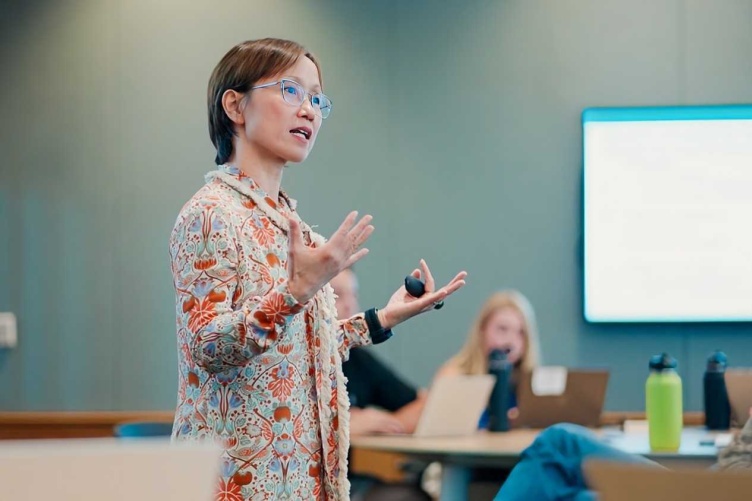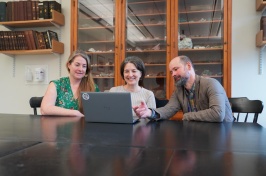
Shuili Du is not one to spend time reflecting on previous research. Her thoughts mostly center on what topics need exploring next.
Du’s enthusiasm and thirst for research were among the attributes that earned her the University of New Hampshire’s Excellence in Research Award.
As a professor of marketing at the Paul T. Paul College of Business and Economics, Du’s research focuses on corporate social responsibility (CSR) and sustainability and how the two topics can work together to increase both business and social value.
“It’s a huge honor,” Du remarked about winning the award. “It’s a good recognition because it gives some visibility to what type of research I’m doing, and it helps to shed light and bring people’s attention to other faculty at Paul College and their research on sustainability.”
Du says teaching students who share her passion for CSR and sustainability is particularly rewarding. Last spring, Du taught a Sustainability in Marketing course that she developed, and it resonated with students.
Students had an opportunity to examine several current social issues — the environmental implications of the fast fashion industry was a popular topic — and picked projects to focus on for poster presentations at the 2023 Undergraduate Sustainability Symposium.
“A lot of students came up to me to talk about how much they loved the course, particularly because this is something they didn’t have a chance to go in-depth with in traditional courses and they feel these issues really speak to them,” she says. “I do realize that Generation Z is very values-oriented, very socially conscious.”
This increased social awareness makes Du’s research especially significant — a far cry from more than 20 years ago when Du and her doctorate advisor were among the few doing research in the CSR and sustainability arena.
Learn More About Shuili Du
“When I started my academic career, people always thought profit and social impact were against each other, it’s a zero-sum game. If you donate, or if an employee volunteers for the community or favorite cause, there is a negative impact on your bottom line,” Du says. “I thought that wasn’t necessarily so, there’s a way it could be a positive-sum game.”
Du’s research has gone on to shed light on the significant role social responsibility plays in business. Last year, a 2007 article she co-authored "Reaping relational rewards from corporate social responsibility: the role of competitive positioning," which studies consumer reaction to the social initiatives of multiple companies, won the prestigious Jan-Benedict Steenkamp Award for long-term impact from the European Marketing Association and the International Journal of Marketing in Research.
Du also looks back fondly on her 2010 article in the International Journal of Management Reviews, “Maximizing Business Returns to Corporate Social Responsibility (CSR): The Role of CSR Communication,” because it was one of the first articles to examine CSR communications strategy.
Currently, Du is focusing her attention on the role artificial intelligence plays in CSR and sustainability. She was the 2019-2020 recipient of a Fulbright distinguished award, which allowed her a five-month visit to the Hanken School of Economics in Helsinki, Finland, and an opportunity to dig deeper into AI.
“That was good because Finland is ahead in terms of exploring the social and ethical implications of AI technology,” Du says. “I attended a lot of conferences and gave a lecture on the topic, and I published a paper as a result of the experience.”
Du’s paper “Paradoxes of artificial intelligence in consumer markets: Ethical challenges and opportunities,” was published in the May 2021 issue of the Journal of Business Research. Her research on the topic continued this summer when she published a short commentary in July in the Journal of Public Policy and Marketing, “AI through a CSR lens: Consumer issues and public policy.”
“I think business school faculty have a role to play examining the business applications of AI and its impact on stakeholders, how it impacts consumers, employees, and the society at large,” she says.
Moving forward there’s no shortage of research topics for Du to tackle. She plans to focus on how AI could spur innovation and facilitate the achievement of the United Nation’s sustainable development goals while keeping an eye out for other relevant topics in the CSR and sustainability field that could start a conversation.
“The nice thing about working in the area of sustainability is that it’s so broad and it’s exciting because there are so many opportunities to explore,” she says.
-
Written By:
Aaron Sanborn | Peter T. Paul College of Business and Economics | aaron.sanborn@unh.edu






















































